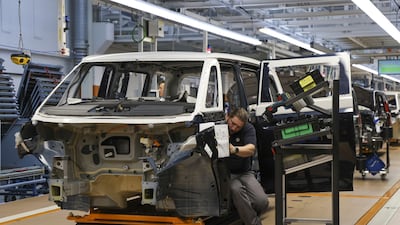Skies were darkening over the German economy on Friday as its flagship car and chemicals industries reported a bleak outlook and companies scaled back production to save energy.
The gas-reliant pharmaceuticals sector sharply reduced its production plans and is under “considerable strain” because of the fallout from the war in Ukraine, said experts at the Ifo Institute for Economic Research.
Confidence in the industry slumped to its lowest level since 1991, a year after German reunification, as the growing energy crisis drastically worsens the economic picture.
Meanwhile, car manufacturers are becoming more reluctant to hire staff as the business climate worsens, and companies believe the situation has become “significantly worse” in the past month, a survey found.
“The general darkening of mood in the economy is also reflected in the automotive sector, with suppliers much more pessimistic than manufacturers,” said Oliver Falck of the Ifo institute.
The business pessimism comes against the backdrop of increasing energy prices and concerns over whether Germany will have enough gas to last the winter after Russia slashed its exports.
Figures released on Thursday by power grid regulators showed industrial gas use dropping by 19 per cent, year on year, in Europe's biggest economy.
Although Germans are being encouraged to save gas for winter, the industrial cuts are considered a double-edged sword in Berlin because they suggest production is being slowed or stopped altogether.
“It helps, but it is not good news,” Economy Minister Robert Habeck said after a cabinet meeting this week. “The era of cheap gas prices … won’t come back quickly, perhaps never.”

Germany’s car and chemicals industries are the biggest in Europe, among the biggest exporters in the world and employ hundreds of thousands of people.
Another German flagship, Lufthansa, had to cancel hundreds of flights on Friday as pilots went on strike to demand higher pay rises.
Mr Habeck had some good news to report after Germany’s gas storage level rose to 83 per cent, beating a target of 75 per cent for the start of autumn.
However, industry is calling for more support to cope with runaway prices after a bungled attempt to redistribute costs left few people satisfied.
“Energy costs are exploding, the competitiveness of our export industry is at stake,” said Wolfgang Entrup, head of a German chemical industry lobby group.
Chancellor Olaf Scholz’s Cabinet agreed on a measure this week to make it easier for industry to switch from gas to alternative fuels, a process which will now be waved through more quickly by regulators.
Ministers are also working on a new support package for Germans but there was further frustration after Finance Minister Christian Lindner revealed it would take 18 months to arrange payments to every household.
This is because the government does not have people’s bank details. Collecting them and matching them to tax records is a long process, and the government's IT systems can only process 100,000 transfers a day, he said.
“It’s not as simple as the coalition making a decision, the money being in the budget and us pressing a button,” said Mr Lindner, who has long bemoaned the pen-and-paper nature of German bureaucracy.

One of the most popular relief measures, a €9 ($9) monthly travel pass for any local or regional train in Germany, expired on Thursday, with a divided coalition unable to agree on a replacement.
Regulators have held talks with industry over potential controlled blackouts if energy becomes too scarce.
Russian gas exporter Gazprom reduced its supplies through the main pipeline to Germany, Nord Stream 1, to about 20 per cent in July for what are regarded in Berlin as spurious technical reasons.
They came to a total halt on Wednesday for what Gazprom said was necessary maintenance, and Germany is braced for Russia to turn off the tap altogether.
Mr Habeck on Thursday ordered a fifth floating gas terminal to boost Germany’s ability to buy fossil fuels from other suppliers, although it will not be ready this winter.
Longer-term deals have been signed with Canada, Qatar and others as Germany tries to free itself of reliance on Russian energy by the middle of 2024.
Germany’s central bank predicted in June that the economy would grow by a subdued 1.9 per cent this year, but that there could be a “pronounced decline” in 2023 if Russian supplies come to a halt.
A survey by Infratest Dimap published on Thursday showed 53 per cent of Germans saying they supported maintaining pressure on Russia even if it led to higher prices at home.
However, this was down from 66 per cent in March, and the poll showed sharp declines in popularity for both Mr Scholz and Mr Habeck, compared with a month ago.


